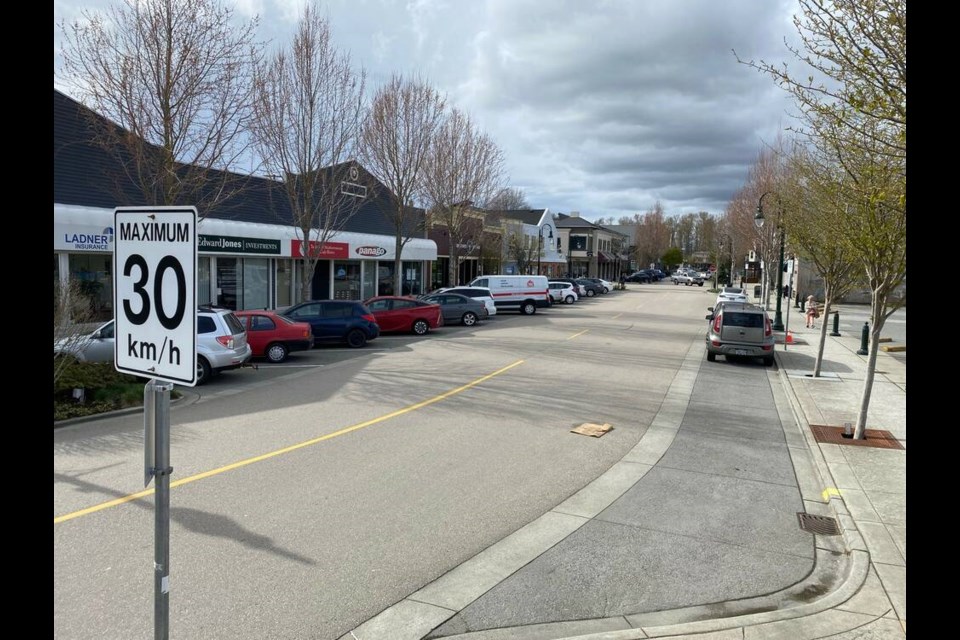It’s the first approved major change under Ladner Village’s new Official Community Plan (OCP) and city council is eager for more.
Council this week granted third reading for the proposed Dunbar Lumber site redevelopment application that will see a new six-storey mixed-use building at the corner of Bridge and Elliott streets.
The project, which includes two levels of parking, is the result of sweeping OCP changes, aimed at encouraging redevelopment and revitalization, approved by council in late 2021.
Those amendments are the result of the Ladner Village Renewal Advisory Committee’s final recommendations in 2020, encouraging redevelopment by allowing higher density including new buildings up to six storeys, depending on the location.
Formed in 2019, the committee met for a year, tasked with coming up with recommendations for two initiatives: the Ladner Waterfront Redevelopment Strategy and the Ladner Village OCP update.
The message the committee heard often was that redevelopment simply wasn’t viable under the current zoning and city policies, something reiterated by several on council this week as they explained their reasons for supporting the Dunbar Lumber site redevelopment.
At a renewal committee meeting three years ago, Brian Hart with Brain G. Hart & Company, Joe Muego with Hearth Architectural Inc. and Wesley Wollin with Buro 47 Architecture talked about opportunities and challenges. All three had been involved with projects in the area.
In a frank discussion, they argued the policies at the time didn’t coincide with what’s economically feasible to encourage redevelopment.
“You have policies, you have OCPs, you have zoning regulations, all of that stuff which doesn’t leave enough space for a developer to figure out what he needs to do. So, get out of the way and just tell us what you want your town to look like and give us, the development industry, a chance to show you how to build it,” said Hart.
Muego agreed, saying a performance-based approach, rather than prospective zoning, is needed.
Hart also noted there’s always a balance, as well as resident push back, which needs to be weighed, but more density is ultimately needed to bring additional residents to support local businesses.
Muego noted what will be needed is political will from the city’s elected officials.
One example was a redevelopment project Wollin had been involved with of a former barber shop building on Delta Street. At the time, it had been more than two years since council gave conditional approval to a rezoning application for a two-and-a-half-storey mixed use building, but the project had difficulty finding an investor.
It wasn’t until the summer of 2022 that council approved an amendment and a development permit for a mixed-use commercial/residential building for the combined properties 4868 and 4872 Delta St., but this time for an increase in storey height and a reduction in strata lot area.
The new proposal was for a three-storey mixed-use building with retail commercial use on the ground level and four residential units above.
Noting the site had been under multiple ownerships that found it wasn’t viable to build what had been approved, Coun. Dylan Kruger, who vice-chaired the renewal committee, last year said he was keen to see the empty hole in the village filled.
Mayor George Harvie agreed, describing the space as “awful on our main street there”.
Harvie also had less than flattering observations about the current state of Ladner Village during the Dunbar Lumber redevelopment vote this week, lamenting the area’s shabby buildings and lack of people, saying the village is in a state of decline.
Kruger described how previous plans and committees failed to materialize anything due to city polices.
Delta previously initiated a revitalization process in 2009 with the establishment of the Downtown Ladner Waterfront Redevelopment Advisory Committee.
In 2012, council eventually gave preliminary approval to a new area plan, but backed off from passing key elements following vocal opponents at a public hearing speaking against proposed heights and densities.
The Dunbar Lumber application didn’t require a public hearing as new rules allow the city not to have one if a proposal complies with an OCP, although councillors this week reiterated the public consultation process and feedback gathered was extensive.




